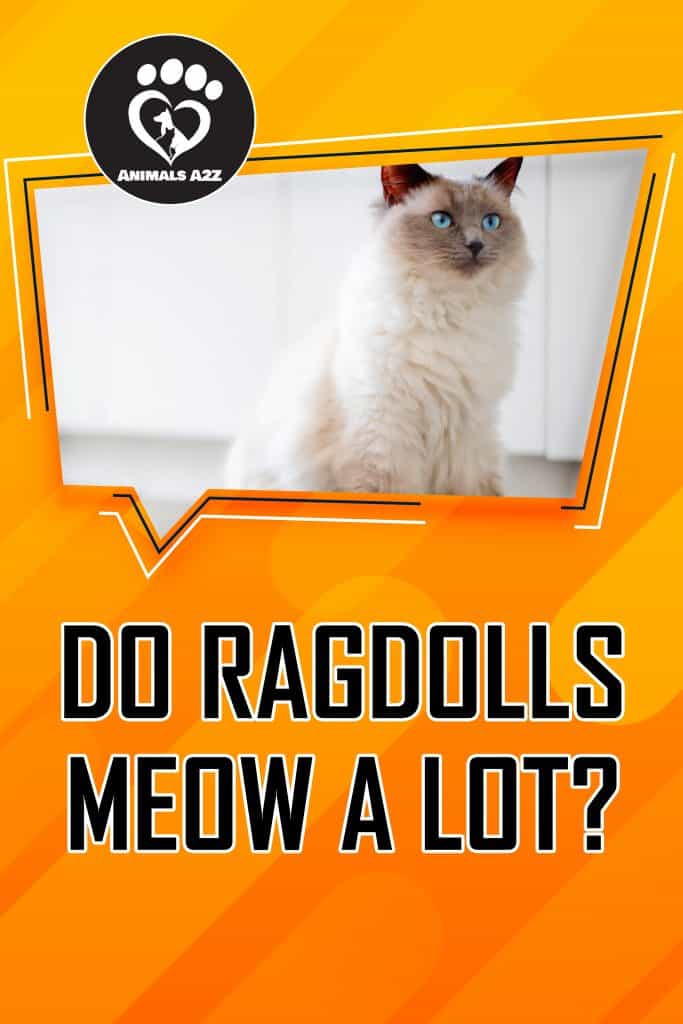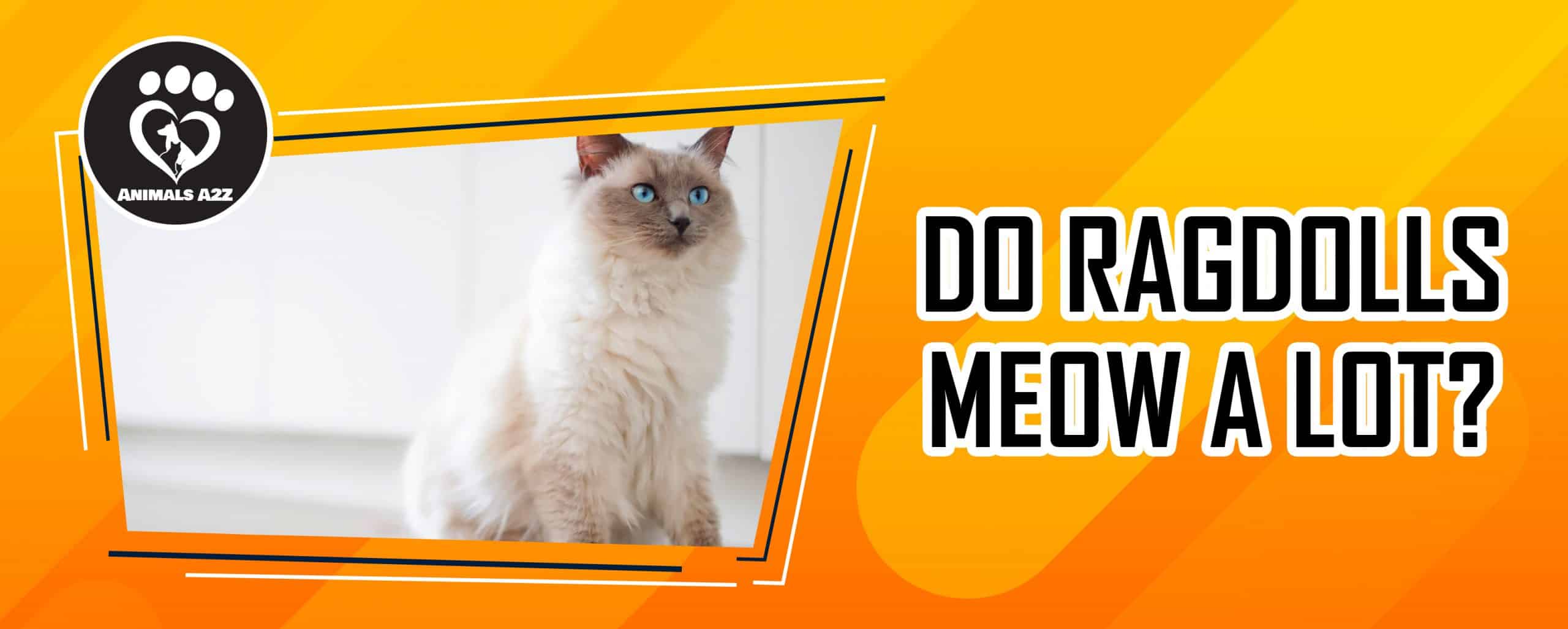Ragdoll cats are often more vocal than other breeds, but why do they meow a lot? Generally, cats are very vocal when communicating their needs and the same goes for a Ragdoll. But occasionally, a Ragdoll may be vocal for other reasons.
Table of Contents
Why Is My Ragdoll So Vocal?
If you notice your Ragdoll meowing more than usual, you may worry that there’s something wrong with them. But cats typically become vocal when they need something, whether it’s food or cuddles, and there’s usually nothing to worry about when your cat suddenly begins meowing excessively.
Why a Ragdoll meows
Although kittens communicate with their cat moms by meowing, adult cats, including Ragdolls, only meow at people and don’t have conversations with other felines through meowing. Ragdolls are an intelligent breed, and these felines quickly realize that by making vocalizations like meowing, they get their human owners’ attention. They usually meow to get to do things for them, and by responding to them, you train them to use their voice to get stuff done.
Type of meows
After they have gotten familiar with the process, expect your Ragdoll to start making different meow sounds, with each one with a different meaning.
Here are some of the most common ones.
Hungry meows
When you prepare your Ragdoll’s food, the sound goes with ripping open packets, opening tin cans, pouches, or the clattering of their food bowl will typically lead to them running to where you are, meowing excitedly. Cats generally have excellent internal clocks and know what their different meal times during the day are. That does why if you forget to feed your Ragdoll, expect them to meow excessively, and the longer you respond, the more urgent their meow will become.
A ‘hello’ meow
Although not all Ragdolls do this, some like to meow as they enter a room or when they see you around the home, which you consider as their ‘hello’ meow. This vocalization is typically bright and breezy. If you have other pets, you may see your Ragdoll greeting them with a tiny ‘trill’ instead of their usual meows with you, which sounds like the letter ‘R’ getting rolled on the tongue.
The ‘I need a favor’ meow
If you’re in a different room or the other side of a closed door, your Ragdoll might meow louder than usual to tell you they want to see you or open the door. You may experience this more often when you go to the bathroom, as, like most cats, Ragdolls have the urge to get into the bathroom more than any other room inside a house.
Please pay attention to me meows
When you notice your Ragdoll meowing in short sudden bursts, this could be a sign that they want to play with you. Another possible cause is that if you’ve been out for a while and your cat has been alone, they may run to greet you, following the same meowing pattern.
Meow of pain
When a Ragdoll is in pain, they may meow woefully, or you can sense some distress in their voice. You can also determine if they’re feeling sick or experiencing pain when their body is all hunched up rather than their usual posture, or they may be having a hard time urinating. When you notice this, bring your Ragdoll to the vet immediately.
Scared meows
When a Ragdoll gets scared, they typically meow louder than usual, which can radiate as intense or scary sounding. If this is the case, your Ragdoll may have seen a predator through your home’s windows or got surprised by a loud noise. This type of meowing subsides when the cause of it stops.
Deafness
A rare cause behind Ragdoll that’s meowing more than usual is that they may be deaf. A few cats are born deaf, with some losing their ability to hear over time. If they’re deaf, they wouldn’t know how excessive or loud they’re meowing or aren’t making sounds at all. A deaf Ragdoll may meow when they’re looking for you.
Common signs of deafness in felines are the following:
- Excessive loud meowing
- They don’t notice when you enter a room right away
- They don’t respond to everyday noise, like you calling their name, opening a bag of treats, or squeaky toys
- They can sleep through loud noises and sleep more than usual
If your Ragdoll is experiencing any of these symptoms and you think they’re deaf, bring them to their vet immediately.
An early sign of cognitive dysfunction
Ragdolls, like any other cat, can develop cognitive problems, which you can similarly compare to Alzheimer’s in humans. Typically, this only happens with senior cats but may also affect younger cats. If this is the case, you may notice your Ragdoll meowing than usual alongside confusion. You’ll notice this happening during the night or when you see them staring at nothing.
How to stop excessive meowing
Once you know the reasoning behind your Ragdoll’s excessive meow, make a few changes to your routines, reactions, and your home to reduce it.
Frequently asked questions about Ragdoll cats
Do Ragdoll Cats Need A Lot Of Attention?
Ragdoll cats are known to be the most docile among cat breeds. However, these cats also need a good amount of quality time and socialization with their family members. Although Ragdolls can be independent, these cats prefer companionship. They love getting attention and spending time with their human friends.
Do ragdolls get attached to one person?
Ragdolls are affectionate cats. They can be cuddly and great lap cats. However, every single cat is different. Some of the Ragdolls can be independent and don’t like being held. Some of them can be friendly to everyone, including visitors, while others can get attached to one person only. These cats will show attachment by following their owner around or sleeping on or next to them.
Is a ragdoll a lap cat?
Yes. Ragdoll cats are ideal lap-cats and a perfect companion for owners of any type. Even though these cats are one of the largest domestic cat breeds, they can be just one big softie with their laidback and affectionate personality.
Wrapping Up
Although there are several reasons why a Ragdoll may become vocal, the most probable cause is that you raised them to be that way. When they’re still kittens, when you respond to their meowing, they will perceive it as a form of communication and get things they need through it, bringing the habit to adulthood.


